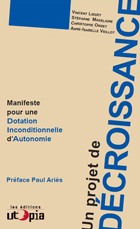
After a 40 hours train journey through the Balkans, I am just back from Istanbul, where I have just spent a week very rich in encounters, reflections, debates, surprises, and of course festive and convivial happenings.
There I attended the 9th International Conference of the European Society for Ecological Economics, 15-18 June 2011.
I also took part in the 3-day (12-14 June) pre-conference workshops with thirty young researchers from all over the world.
What is ecological economics?
Ecological economics is a branch of economics, which calls into question neoclassicism, as the English academic Clive Spash has clearly demonstrated during the first pre-conference day. Among the pioneers and the sources of this field of research, many are cited in the Degrowth debate; to name a few: Nicholas Georgescu-Roegen, Karl Polanyi, Ernst Friedrich Schumacher…. Only the cultural approach and our references are missing to the list: Illich, Gorz, Castoriadis, Ellul, Charbonneau, Lartouche, and so on…..
It should not be confused with environmental economics; so decried for its neo-classical meanderings and its denial of reality. Clive Spash has demonstrated after a few years of difficult collaboration, the incompatibility of the two approaches and the need for a radical and coherent approach to realise the emancipation of ecological economics.
During the 2nd pre-conference day, a question very dear to the growth objectors was raised: “Is capitalism eco-compatible?”. Pat Devine from the university of Manchester, was in charge of proceedings and Degrowth was referred to a lot, albeit in a somewhat confusing manner. It is very hard to explain to our economists friends that Degrowth is not degrowth for degrowth sake, which would be on par with growth for growth sake.
The strength of Degrowth
The entire third day was dedicated to… Degrowth. A strong contingent of our friends from Barcelona orchestrated the day. They had come by boat and by train through the Mediterranean see and the Balkans. A strong team of Degrowth researchers from the autonomous University of Barcelona formed around Francois Schneider; the instigator of the march toward Degrowth in 2005 and, with Fabrice Plipo, the First International Conference on Economic Degrowth for Ecological Sustainability and Social Equity; Paris 2008.2
The team is led by the great professor Joan Martinez Alier (one of the precursors of ecological economics), who did organise last March Second International Conference on Economic Degrowth Their work methodology includes on-going collaborations between activism, experimentations and academic research. During the last two years they have published ten articles in peer-reviewed academic magazines, thus allowing Degrowth to slowly infiltrate the Anglo-Saxon world
(English literature on Degrowth remains quite poor) and the academic world (dominated by the English language!).
Thanks to them among others and also the reflexions from French Degrowth movement (in particular with the UAA3) Degrowth has occupied a place of choice throughout the conference: workshops, sessions, questions from the floor…. thus gaining prominence in an organic manner. It was the main talking point during the coffee breaks, lunches, and evenings…….
Perspectives
Degrowth, as Paul Aries often puts it, is a political UFO, but it is also an academic one. It surprises, destabilises thanks to its inter-disciplinary approach, its radicality, and its coherence. It also acts as an itching powder and a dogma breaker; it opens up new perspectives, mainly thanks to the Barcelona team and its transdisciplinary approach, its organisation based on self-management, the participation, and the integration of civil society in its research and discussions.
This freedom generates enthusiasm but it can lead to confusion and, unfortunately, I must admit that some discussions with academics bewildered by this multidisciplinary and radical approach, have been fruitless. What is Degrowth? As it was the case in France, the question kept coming back, “ How to define Decroissance (Degrowth) simply?”, and, ‘ Why such a negative term?” In English it is Degrowth, in German it seems that a consensus has been reached around post- growth (post-wachstum). In France we have been successful, even though the debate is still ongoing, in endorsing a provocative slogan that acts as a bomb, acting as an ideological irritant. Many Growth Objectors, but not all, regroup behind this term and the political thinking that it represents.
In France, and almost everywhere in the occidental world, Degrowth is spreading, interrogating, leading to ideas…but is still searching itself.
Vincent Liegey
PhD student at the university of economy of Budapest, former spokesperson of the French Degrowth Movement.


